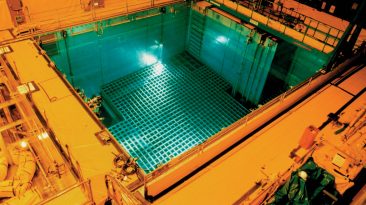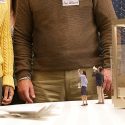How far into the periodic table could you get? Would you be breaking any laws? At what point would your periodic table start killing you?
If you’re willing to spend $1,700, you could actually buy a ready-made set of the elements online. But where is the fun in that if you can make your own collection from scratch?
Scrape off the layer of copper on a penny minted after 1982 – and you’ll get pure zinc. Take apart a few batteries for carbon rods. Tear down smoke detectors for americium.
In the end, you could even pull some pure gold from your old cell phone. No matter how you collect your elements, you should always keep them in their sealed bottles. But what if you didn’t?
What if out of curiosity you decided to put all 118 elements together to resemble the actual table without any glass barriers?
There are seven rows in the periodic table. Starting on the first row, hydrogen and helium wouldn’t cause you any trouble, aside from them rising upward and dispersing right away.
These elements are just like your introvert friend who always leaves the party before it gets good. Next, the second row. If you weren’t careful enough, you’d start coughing and have difficulty breathing.
That’s what beryllium poisoning looks like. At this point you should consider wearing a gas mask, since you’d also have yellow fluorine gas spreading on the ground and burning everything it touches. Other elements of the second row are harmless.
Neon would simply float away, while oxygen and nitrogen would be drifting around until they disperse. You wouldn’t stop at just two rows, would you? No. So, let’s move to the third one. It would burn you with fire.
Sulfur normally doesn’t do anything bad other than stink. But with fluorine and chlorine by its side, it would immediately catch fire.
On top of that, white phosphorus would spontaneously burst into hot flames that would be very hard to extinguish. Maybe you ought to just stick to doing chemistry class experiments… Instead, with your lab on fire, you’d decide to go on and stack the fourth row. Fine.
Adding potassium to the mix would set the arsenic on fire, too, releasing large amounts of arsenic trioxide. You sure don’t want to inhale that toxic stuff. There would be some interesting effects though.
As the elements on your periodic table were reacting to each other, aluminium would become as soft as wet paper.
Sulfur would stop smelling so bad. But if you weren’t careful, exposure to toxic smoke would have already killed you. These toxic elements would “eat” your body – and your mask too! You could sue your gas mask producer.
But you’re too smart to die so early in the experiment… you’d be watching from a safe distance – and you’d live to stack the fifth row.
This row would be much like the fourth, except for one thing – say hello to the first radioactive element in your collection – technetium. You still alive over there? Well, the next row of the table would fix that, no matter how far or how careful you were.
Because the sixth row contains radon, polonium, promethium and astatine – all radioactive elements that you don’t want anywhere near you.
Ever. Stacking them together would result in a massive explosion and a cloud of toxic fire and dust. In a matter of milliseconds, you’d get a lethal dose of radiation.
You and the city that might’ve sued you for conducting such an experiment. At that point, there would be no one left to add the seventh row to your periodic table.
That’s probably for the best, since most of its elements are so unstable they can’t exist longer than a few minutes. They would radioactively decay into elements that also decay. Wonder what that looks like?
The reactions from adding the 7th row would be like a nuclear bomb exploding over and over again.
A mushroom cloud would rise over the area. It wouldn’t be just radioactive fallout, it would leave the radioactive footprint of thousands of Chernobyl disasters.
So, if you want to pick a new hobby, keep in mind that there are a lot better things to collect.
Sources
- Munroe, Randall. What If? Serious Scientific Answers to Absurd Hypothetical Questions, Periodic Wall of Elements. London: John Murray, 2015.
- Theodore Grey, How to Get Your Own Element Collection
- Instructable by Hulkguild, Start an Element Collection – How to Find Samples in Everyday Places
- 10 Periodic Table Facts
- 20 Things You Didn’t Know About The Periodic Table
- FUN Facts About Periodic Table
- PERIODIC TABLE
- Periodic Table Facts



























